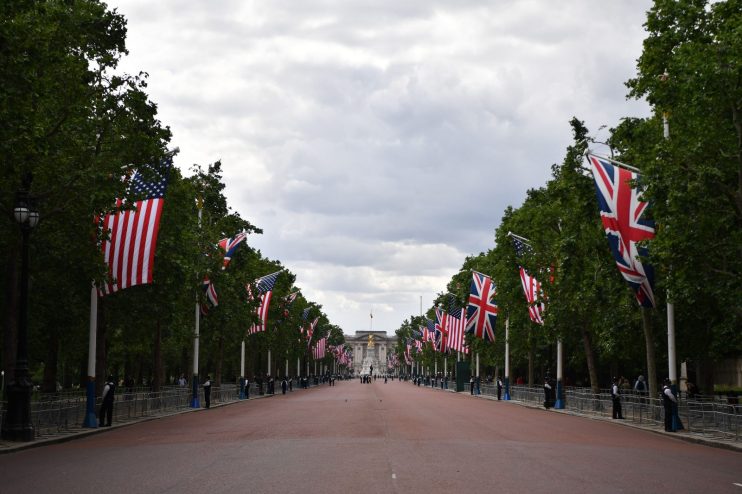Racing against time: The UK-US trade deal and the 2020 election

WASHINGTON, D.C. – International trade secretary Liz Truss recently made it clear that the UK needed to close a US trade deal by mid-2021 if it was going to happen any time soon. In July, the US government’s Trade Promotion Authority -which allows trade deals to be passed through Congress without being amended – will expire.
Donald Trump and Boris Johnson’s friendly relationship has been seen as potentially holding the key for unlocking a deal before this looming deadline. A source inside the UK’s embassy in Washington told City A.M. that the bulk of a deal could be negotiated by the end of the year while Trump will still be in office, regardless of tomorrow’s election result.
The UK has indeed said talks are now in an “intensified” phase with texts being prepared by negotiators, however several areas are believed to be holding up serious progress.
The US wants to open up its massive agricultural industry to export more to Britain, however this would require the UK to accept America’s food standards – something Truss has said she will not do.
Before the Open newsletter: Start your day with the City View podcast and key market data
US lawmakers have also said they will not accept a deal while the UK’s new digital services tax – which taxes Silicon Valley giants on revenues they make from British customers – is in place.
The NHS’ role in trade talks is also a point of contention, with the US reportedly seeking to increase access for the country’s pharmaceutical giants – also something Truss has said is off the table.
Iowa Republican Senator Chuck Grassley, chair of the Senate Committee on Finance which approves all trade deals, said he still believed it was possible to get a deal done before the Trade Promotion Authority ended.
“I believe that even a Biden administration will want to deal with the UK and I don’t think the economy of the UK and the United States are so much different that things Democrats might be demanding in a new TPA would be an issue,” he said.
Grassley also stoked fears about including the NHS in talks, telling City A.M. that the NHS should be on the table.
His comments, originally reported last week, sparked outrage from Jeremy Corbyn on Twitter and a public rebuke from Truss.
“I would hope that the National Health service would be open to some competitive approach that would benefit our pharmaceutical companies,” he said.
Many British commentators have said any prospect of a deal could evaporate if Joe Biden wins the US election next week as is widely expected. Biden is not a supporter of Brexit, unlike Trump, and he has recently warned Johnson that any breach of the Belfast Good Friday Agreement would lead to serious backlash from Washington.
The Prime Minister recently introduced legislation that would breach the Withdrawal Agreement, as it pertains to Northern Ireland, if the UK leaves the EU’s single market and customs union without a deal on 31 December. Brussels has said that this could constitute a breach of the Good Friday Agreement.
Biden’s economic plan is also centred around a “Made in America” initiative, leading many to speculate that he will be more protectionist in office if he wins.
However, Westwood Capital investment banker and economics pundit Dan Alpert believes the UK may be more likely to get a deal with Biden than Trump.
He said the President’s unpredictable nature meant it would be hard to ever broker a deal with him.
“The primary differential between a Trump administration and a Biden administration is that I think the UK can actually get something done with the US under a Biden administration,” he said.
Alpert speculated that Biden may be more willing to alter rules around food standards, which would make a deal with the UK easier.
“I’m not saying we’re going to do away with chlorinated chicken overnight, but the idea of perhaps addressing the issue in a more constructive way…is I think far more likely under a Democratic administration than it is under the Republicans,” he said.
It may be that regardless of the election result that a UK-US trade deal is unlikely to happen before mid-2021.
Trump’s language around trade is often about “winning” or “getting screwed” as we have seen with his rhetoric on the US’ relationship with China and the EU.
Any trade deal he would agree to with the UK would be heavily swayed in the US’ favour and it is unlikely Downing Street would concede to this, despite Johnson being desperate to sign post-Brexit deals.
Matthias Matthjis, research fellow at the Council on Foreign Relations think tank, said: “In a very parochial way, because Boris Johnson and Trump have this personal rapport and because Trump is a supporter of Brexit there is reason to think a Trump victory would be good for the Johnson administration, but I think in the end he’s so unpredictable and it’s unlikely to get this amazing trade deal from Trump.
“He doesn’t give presents.”
Biden, meanwhile, will have to deal with a multitude of domestic crises in his first six months if he wins the election, which will likely push trade deals well down his agenda.
“I don’t think there’s going to be any big trade deals between the US and EU or between the UK and US in the next administration, it’s just not a priority,” Matthjis said.
“I think his priorities will be overwhelmingly domestic – coronavirus, the economy and race relations.
“For the UK my sense is that for Johnson…in the end the levelling up agenda is also more important and so having chlorine chickens available at lower prices…I don’t think there are clear wins there.”